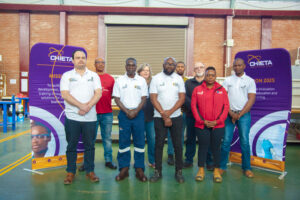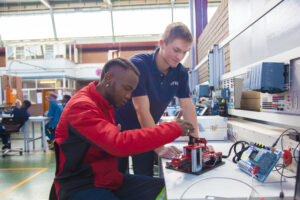What is the mandate of the Chemical Industries Education and Training Authority (CHIETA)?
CHIETA is a statutory body that was established by the Skills Development Act in 1998. CHIETA’s role in the sector is to facilitate skills development as well as to ensure that skills needs are identified and addressed through various training initiatives in the chemical and manufacturing industries. As a trusted partner in skills development and training for the chemical sector, CHIETA funds the industry for various occupational programmes as well as certain Technical Vocational Education and Training (TVET) sector and higher education programmes. Our mission is to facilitate skills development, education and training through innovative solutions for sustainable livelihoods.
How do you empower South Africa’s youth?
CHIETA offers learnerships and other youth programmes to unemployed youth to promote employability in line with government policy as per National Skills Development Strategy (NSDS III) objectives.
CHIETA has entered partnerships with various parties to drive innovation, skills development and training in Africa. Our role includes sourcing corporate entrepreneurs in the chemical sector to upskill them and identifying Fourth Industrial Revolution-linked programmes. The impact of this is that it will help provide youth with skills to combat unemployment.
We offer a wide range of discretionary and mandatory grant funding directed towards women, youth and people living with disabilities. One major programme launched during 2023 was the Smart Skills Centres, in which rural learners are taught digital skills to keep abreast of artificial intelligence (AI) developments. The authority intends to establish these centres in all nine provinces.
Another project that stands out is the AlgoAtWork Robotics Academy in Richards Bay, in which children are taught essential skills for an AI-driven workplace in the future. Numerous bursaries flow into learning support and programmes for retrenched employees, a fundamental way CHIETA supports the Economic Reconstruction and Recovery Plan (ERRP).
Through its various programmes, including the upcoming Discretionary Grant Funding Windows and working with corporations, CHIETA provides potential opportunities for 615 internships, 1 085 leadership, 1 395 skills programmes and 1 285 TVET students for Work Integrated Learning.
CHIETA offers unique training programmes providing practical skills for matric graduates’ employability. Please tell us more.
CHIETA offers graduates or students looking for workplace experience, work exposure or work-integrated opportunities in the chemical sector. They also have programmes such as work readiness and job preparedness programmes, entrepreneurship development programmes, mentorship and market access programmes to support employability.

Please provide an overview of the learnerships and apprentices that you offer.
CHIETA will also continue to support fundamental skills focus areas including artisan training, learnerships, work-integrated learning and coherent skills training programmes (also known as part-qualifications) that allow for immediate job mobility while leaving the door open for candidates to further enhance their learning to obtain the remaining parts of the qualification incrementally using the lifelong learning principle. The apprentice career fields include boilermaker, draughtsman, electrician, fitter and turner, industrial machinery mechanic, instrument mechanic, millwright occupational instructor, refrigeration mechanic, rigger, truck driver and welder. Learnerships are directly related to occupations in the various fields of science, engineering and business.
Please tell us about CHIETA’s industry collaboration.
The organisation has adopted a partnership mode informed by the four strategic pillars (innovation, collaboration, digitisation and transformation). The strategic value of this approach is the contribution of these partnerships towards consolidating the organisational capacity to deliver stakeholder value and achieve the desired social impact.
TVET college sector partnerships and Community Education & Training Colleges (CET) partnerships play a critical role in the supply of skills:
Coded Welding (pilot project) with TVET colleges:
A pilot project on blended learning to explore e-learning using the Coded Welding Skills Programme to curb youth unemployment, improve livelihoods and support economic development. The lessons and best practices would be shared towards the implementation of e-learning in the chemical sector.
Sefako Makgatho Health Sciences University:
CHIETA funded Sefako Makgatho Health Sciences University to partner with pharmaceutical companies to offer work-integrated learning for undergraduate students who are studying pharmaceutical-related qualifications.
Trade unions in the chemical sector:
Reskilling of the chemical industry’s retrenched workers.
CHIETA/CHEMIN Innovation Hub:
The programme supports entrepreneurs in developing ideas into profitable businesses through incubation programmes.
CHIETA/UJ Multi-SETA Project:
Grow collaboration among SETAs (envisioned partnership with EWSETA, ETDPSETA, Services SETA, AgriSETA and INSETA). The collaboration with the other SETAs for cross-sectoral SMME development will enable competitiveness and increased productivity of SMMEs participating in this programme for them to survive in the ever-changing business environment. These SMMEs will be the catalyst of job creation and economic growth.
CXI African Strategic Projects and Youth Media Movement:
The digital skills gained from these projects will provide the youth with an opportunity to enter occupations in high demand and contribute significantly to the digital revolution and economy in South Africa.
China Europe International Business School (CEIBS):
Support for corporate entrepreneurs within the chemical sector to grow the economy.
Smart Skills Centres:
Smart Skills Centres will be established in all nine provinces.
CHIETA/MICT SETA/INSETA:
Partnering on strategic projects that are aligned with the organisations’ mandates and will contribute to:
- Economic empowerment
- Youth employability
- Food security
- Entrepreneurship and business support
- Digitisation and 4IR.
- The SETAs are partnering to identify the priority research areas and conduct research to support the CHIETA, INSETA and MICT sector skills plans.
How does CHIETA use innovation in its training initiatives?
 We not only use and encourage the support of e-learning and blended learning methods as we forge ahead, but it is imperative to strengthen our existing partnerships with both the private and public sectors. Concomitantly, we must cement new and lasting partnerships that will allow us to put the chemical industry on the fast track to adopting 4IR and to continue to innovate in our quest to eliminate poverty, reduce inequality and spur the economic development of the country. We aspire to be a fully digitised, innovation-driven SETA that is not just about skills development, but about sustainable livelihoods and improving the quality of life. We want to support the end-to-end value chain of sustainable livelihoods. We conduct virtual reality-based training and promote the use of AI in education and training. We want to impact 100 000 livelihoods by 2025.
We not only use and encourage the support of e-learning and blended learning methods as we forge ahead, but it is imperative to strengthen our existing partnerships with both the private and public sectors. Concomitantly, we must cement new and lasting partnerships that will allow us to put the chemical industry on the fast track to adopting 4IR and to continue to innovate in our quest to eliminate poverty, reduce inequality and spur the economic development of the country. We aspire to be a fully digitised, innovation-driven SETA that is not just about skills development, but about sustainable livelihoods and improving the quality of life. We want to support the end-to-end value chain of sustainable livelihoods. We conduct virtual reality-based training and promote the use of AI in education and training. We want to impact 100 000 livelihoods by 2025.
What is CHIETA’s perspective on tackling unemployment?
We can improve the agility of educational and training institutions. When the economy needs new skills, how fast can the country’s training providers react? An essential pillar of CHIETA’s vision is to overcome the difficulty that many communities in South Africa, predominantly in rural areas, have in accessing digital skills and opportunities. Therefore, bridging the digital divide is crucial if the country is to address the challenges around skills. The impact of upskilling people in 4IR-linked programmes is that it will help provide youth with skills to combat unemployment.
What are some of CHIETA’s success stories that illustrate the tangible impact of your initiatives?
CHIETA received a clean audit, met 100% of its targets and grew levy income year-on-year from R592-million to R621-million. CHIETA is determined to continue making a difference and working on the hydrogen economy for which it has gained a growing reputation as a leader in the green economy.
We take comfort from the fact that we are putting resources behind dozens of young girls interested in science – at least 217 last year – with positive results to boot.
The Eastern Cape Department of Education recognised hard-working matriculant Liyabona Ncanywa as one of the province’s top achievers in the 2023 national senior certificate examinations. CHIETA assisted her with tuition and school fees through its science, technology, engineering and mathematics (STEM) fund that supports 1 000 learners nationwide.
Through its various programmes, including the upcoming discretionary grant funding windows and working with corporations, CHIETA provides potential opportunities for 615 internships, 1 085 learnerships, 1 395 skills programmes and 1 285 TVET students for work-integrated learning.
Please discuss CHIETA’s role in addressing high unemployment rates among the Class of 2023.
In the past year, CHIETA supported the Economic Reconstruction and Recovery Programme (ERRP) of the government through three programme initiatives, namely:
- Occupationally directed programmes
- The STEM programme to grow the number of women and people with disabilities entering the chemical industry
- Support programmes for co-operatives, SMMEs, non-governmental organisations and community-based organisations in both rural and urban areas
- These have yielded positive strides and evidence of success since inception.
- CHIETA’s role in the implementation of an innovation, skills development and training programme in Africa includes sourcing corporate entrepreneurs in the chemical sector to upskill them and identifying 4IR-linked programmes.
How do we start building an innovative and employable workforce for South Africa?
We can improve the agility of educational and training institutions. As an innovation leader in education, skills development and training we don’t want to train for the sake of training. Our broader goal is to improve the quality of life by focusing on sustainable livelihoods. We focus on reskilling and upskilling people to ensure they can have sustainable livelihoods. As industries like ours and others digitalise, we see a demand for what one could call cross-over skills, skills that are as valuable in mining or retail as they are to our industry, which means that we must broaden how we interpret our remit.
Bridging the digital divide is crucial if the country is to address the challenges around skills.











